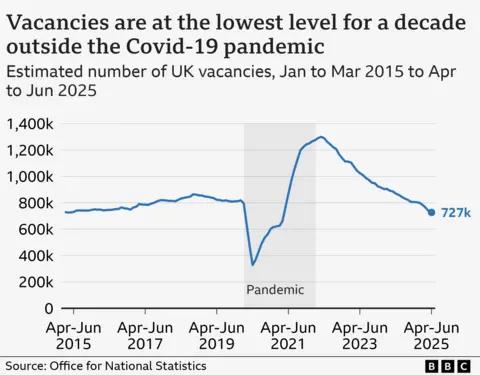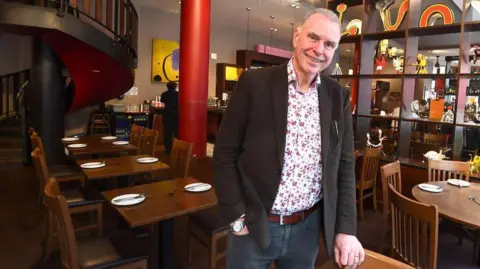UK jobs market weakens as unemployment rate rises
24 minutes agoMitchell LabiakBusiness reporter, BBC News

 Getty Images
Getty ImagesThe UK jobs market has weakened as wage growth slows and the unemployment rate rises, official statistics show.
The annual rate of pay growth in the three months between March and May slowed to 5%, the Office for National Statistics (ONS) said.
Meanwhile, the unemployment rate rose to 4.7%, its highest in four years, though the ONS has said the figure needs to be treated with caution due to problems with how the data is collected.
Economists say a weaker labour market makes it more likely the Bank of England will cut interest rates in an attempt to boost the economy at its meeting next month.
Earlier this week, in an interview with the Times, the Bank of England governor Andrew Bailey indicated there could be larger cuts to interest rates if the jobs market showed signs of slowing down.
Most economists are predicting a cut – though some say it would be unwise to encourage spending while inflation is still rising.
Meanwhile, the ONS said the number of vacancies fell again to 727,000 for the April to June period, marking three continuous years of falling job openings.


It added that survey data suggested that some firms may not be recruiting new workers or replacing ones who have left.
The number of job vacancies is now at its lowest in 10 years, excluding the plunge seen during the pandemic when lockdowns stopped firms from hiring.
Yael Selfin, chief economist at KPMG UK, said the “slowing pay growth opens the door for an interest rate cut in August”.
“The impact of April’s tax and administrative changes has led to a marked slowdown in hiring activity among firms,” she added.
“With domestic activity remaining sluggish, the MPC will likely want to provide support via looser policy to prevent a more significant deterioration in the labour market.”
‘We’re managing by the skin of our teeth’

 Andrew Teebay
Andrew TeebayPeter Kinsella runs two Spanish restaurants in Liverpool City centre and says this is the toughest period for the business since the financial crisis in 2008.
He says the increase in employer national insurance contributions has “really impacted our recruitment. We employ fewer people than we did in March.”
Peter has cut staffing hours, decreased opening times, and invests less in repairs in the restaurant to make money go further.
“We’re managing, but by the skin of our teeth”, he says.
He’s also being more cautious about hiring new staff, often reluctantly not replacing people who leave the business.
“It’s a fantastic thing to take people on, to give them work. So we want to avoid at all costs those things that have a real impact on people’s lives, but we’ve had no choice”.